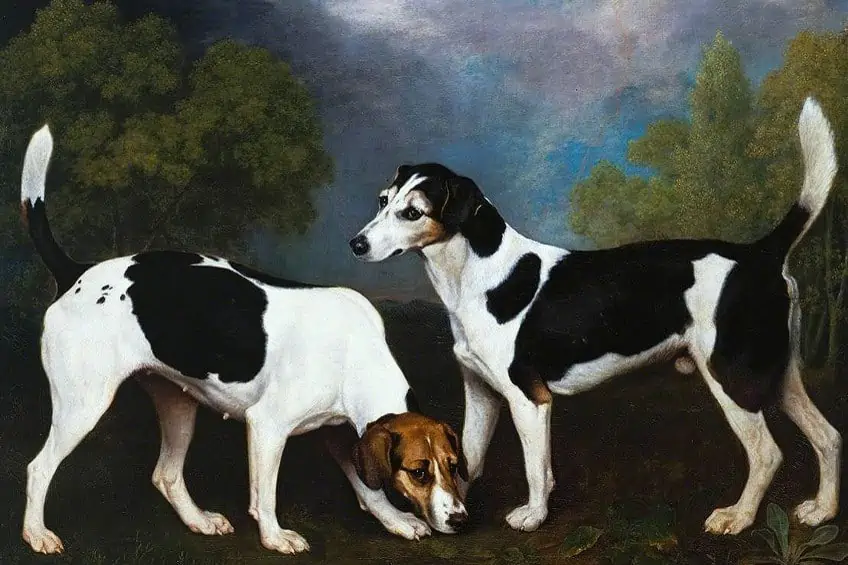Famous Dog Paintings – Take a Look at the Best Dogs in Art
It is no real surprise that there are so many representations of dogs in art, as these loyal animals have been featured in our lives for many centuries as both protectors and companions. On some occasions, paintings with dogs featured in them are created to portray serious hunting scenes, whereas other times dog artworks can be humorous – depicting dogs involved in a game of cards, for example. Dog painting artists have an affinity for our four-legged companions, and this can best be observed by examining a few select famous dog paintings.
The World’s Most Famous Dog Paintings
For more than 23,000 years, man and canine have shared a close bond. It is, therefore, only natural that we have created so many paintings with dogs to celebrate that age-old connection. Dog artwork can be found in many art styles, as dog painting artists exist in almost every genre of painting.
The theme of dogs in art stretches far back into our past and reveals the strong relationship shared by these two species.
Lady Hamilton (1782) by George Romney
| Artist | George Romney (1734 – 1802) |
| Date Completed | 1782 |
| Medium | Oil on canvas |
| Current Location | Tate Museum, London, United Kingdom |
George Romney was a well-known British portrait painter who flourished in the 18th century. Romney was known for his ability to create extremely realistic paintings, and he was requested to create many various portraits for rulers and popular individuals over his career. Lady Hamilton is one of his most famous dog artworks.
This 1782 artwork is noted for the artist’s exceptional use of lighting against a darker backdrop, which highlights the attributes of the lady in the painting.
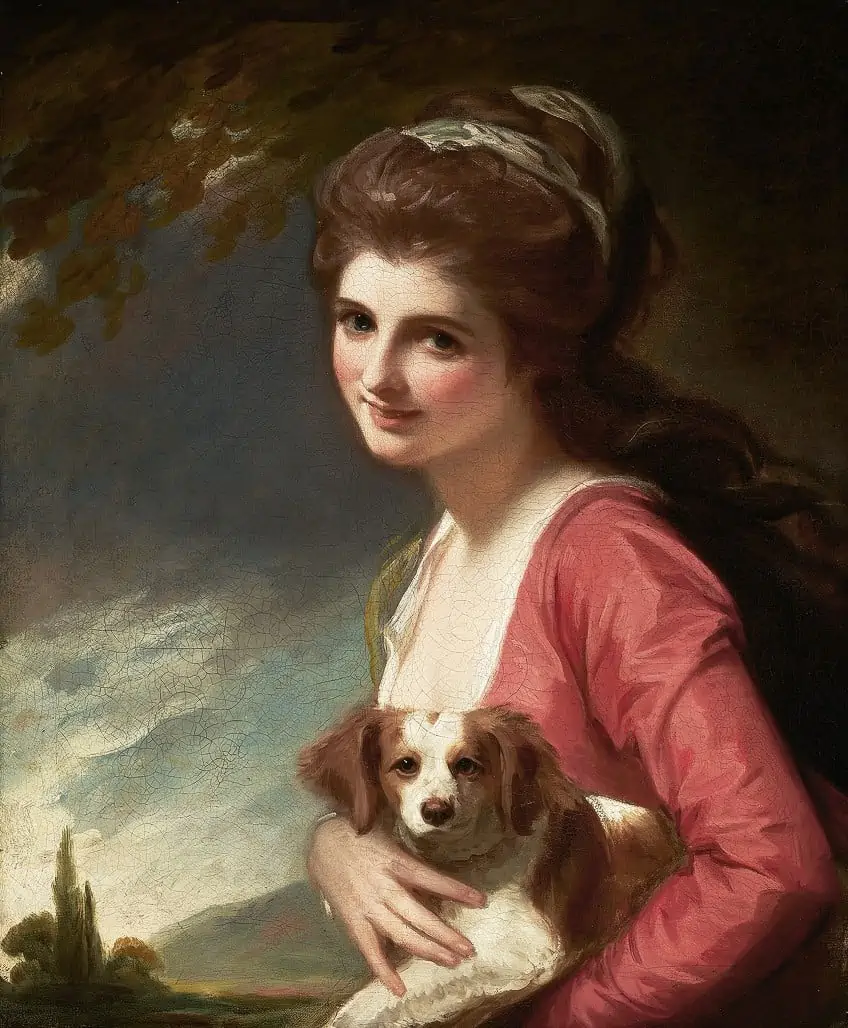
The puppy she carries in her arms is seen staring at the observer with an inquisitive expression on its face. Emma Hamilton was a stunningly beautiful and charming woman who went from humble beginnings to international acclaim.
She was the mistress of Charles Greville, who commissioned this image, and instructed her in literature and music.
A Couple of Foxhounds (1792) by George Stubbs
| Artist | George Stubbs (1724 – 1806) |
| Date Completed | 1792 |
| Medium | Oil on canvas |
| Current Location | Tate Museum, London, United Kingdom |
The Reverend Thomas Vyner most likely commissioned this dog artwork. On two separate occasions, Stubbs was believed to have painted for the Vyner family upon his return to Lincolnshire. Vyner was an ardent athlete and equestrian, as well as a hound breeding specialist. He was a personal friend of Baron Yarborough, with whom he regularly hunted.
Stubbs created a portrait of the leader of the Brocklesby pack the same year he produced this image, and the hounds portrayed in this piece are most likely of the same breed.
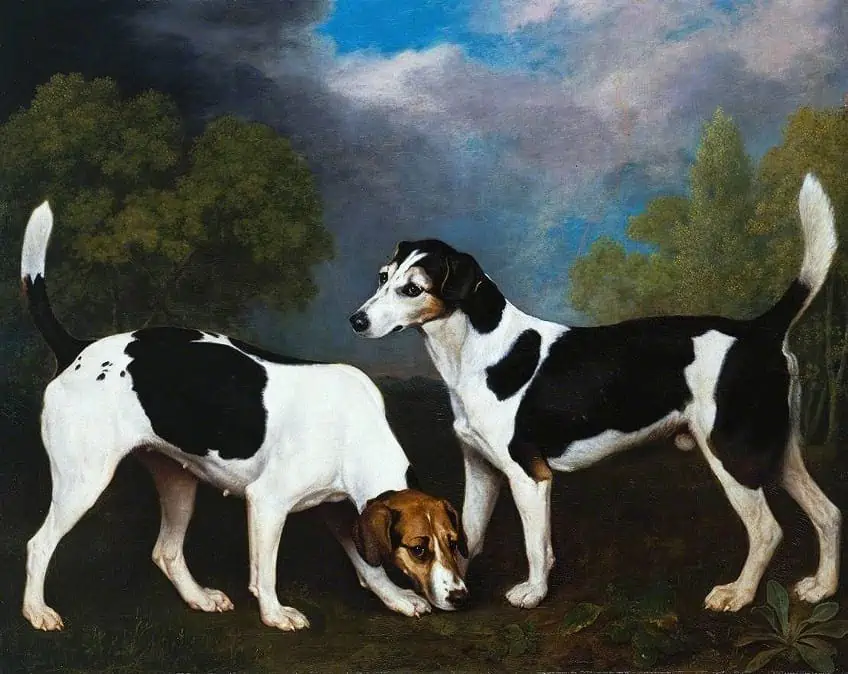
Stubbs’ technique was to create the foreground animals first, then the backdrop and sky, up to and frequently over the contours of the other objects. Stubbs was lauded for his ability to depict the canines with great accuracy, and he went on to make many more pieces featuring foxhounds throughout his artistic career.
The Dog (1823) by Francisco Goya
| Artist | Francisco Goya (1746 – 1828) |
| Date Completed | 1823 |
| Medium | Oil canvas |
| Current Location | Museo del Prado, Madrid, Spain |
The composition of this dog artwork is relatively basic, with two parts separated by a lower and upper portion. The sky has a distinct pale reddish hue, while the dog can be seen at the bottom, its body covered by what looks to be sand or some form of material. The work’s significance has been debated by scholars, although most believe that Goya was just attempting to depict a feeling of isolation in the dog’s posture. The dog’s head is elevated, and his ears appear to be positioned as if he is paying attention to something on the side of the painting that is not visible.
It is impossible to establish Goya’s intention with this piece because it was never intended to be publicly shown.
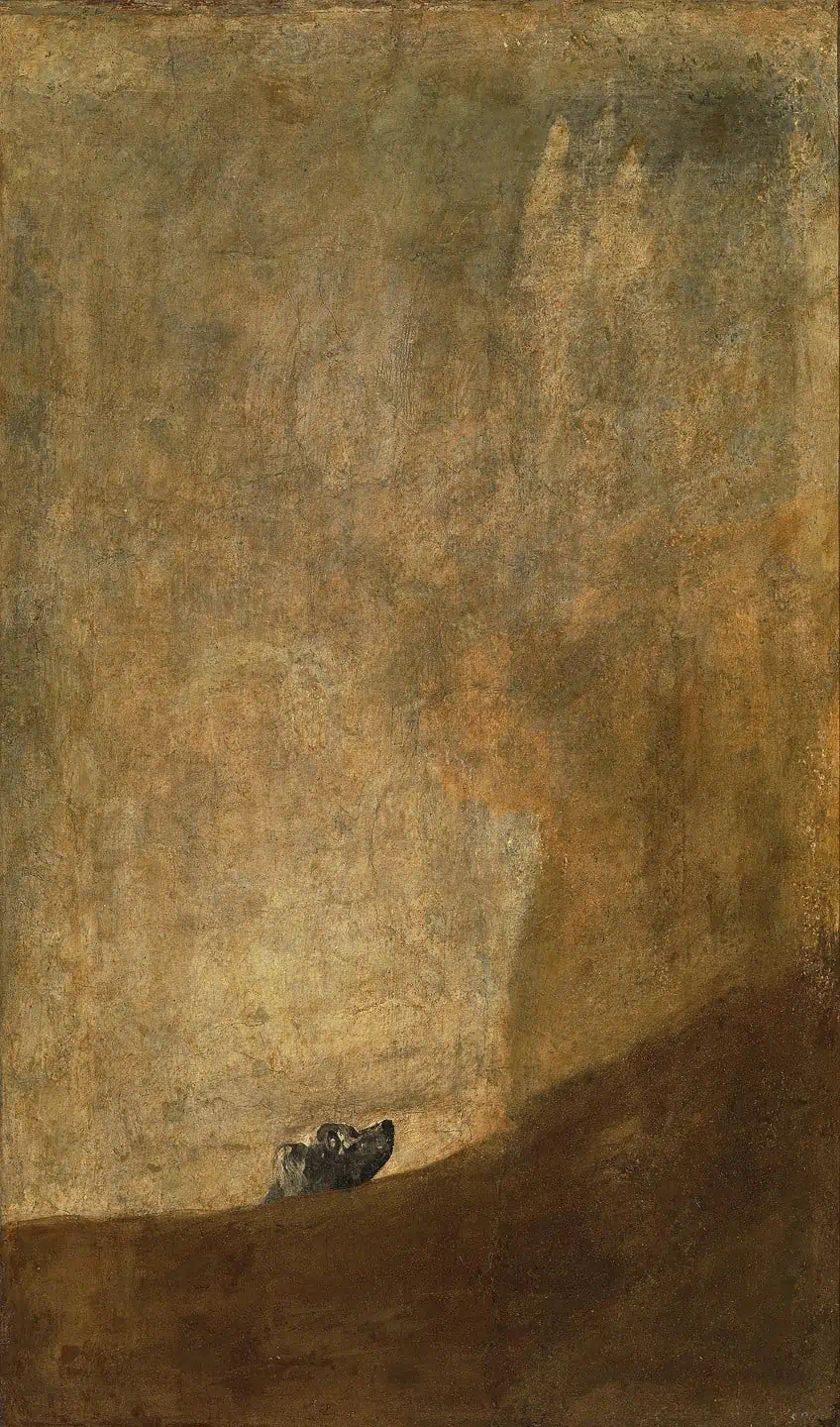
A Jack in Office (1833) by Sir Edwin Landseer
| Artist | Sir Edwin Landseer (1802 – 1873) |
| Date Completed | 1833 |
| Medium | Oil on panel |
| Current Location | Victoria and Albert Museum, London, United Kingdom |
This is one of Sir Edwin Landseer’s earlier paintings, and it is among the most easily recognizable of any dog artwork, according to art historians. This painting is full of symbolism and humor. The painting’s title is derived from the kind of dog seen in the picture, a Jack Russell.
Art analysts say the painting is a metaphor for power structures and political authority, as we can observe the Jack Russell terrier completely in control of the scene as he perches on the tabletop and safeguards the food from the other animals.
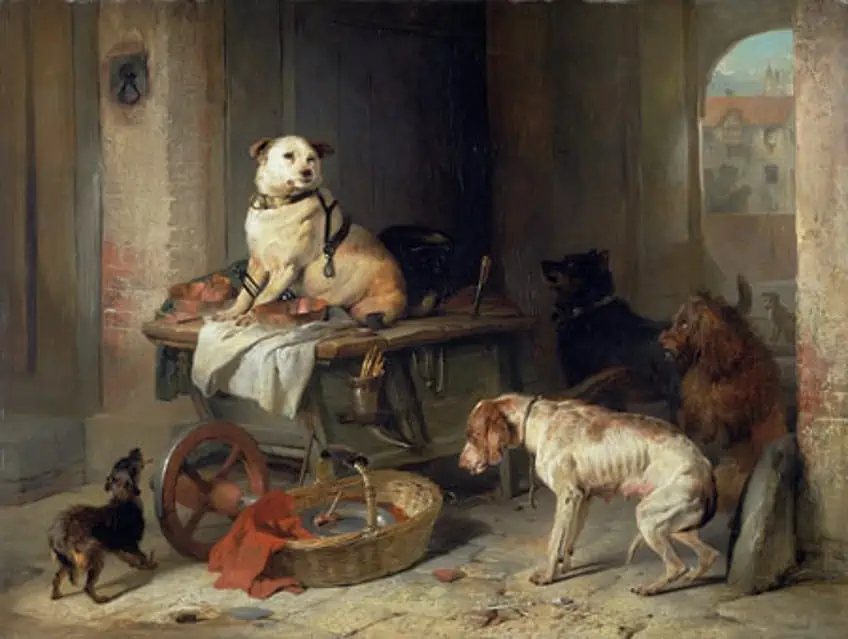
This dog artwork depicts the unjust treatment that many individuals receive from their authorities, as the Jack Russell is perceived to be overfed to the stage of obesity, whereas the other animals, who are timidly skulking around the table in anticipation of nabbing a crumb or bit of food, are badly emaciated.
Diogenes (1860) by Jean-Léon Gérôme
| Artist | Jean-Léon Gérôme (1824 – 1904) |
| Date Completed | 1860 |
| Medium | Oil on canvas |
| Current Location | Walters Art Museum, Baltimore, United States |
Jean-Léon Gérôme’s well-known painting of Diogenes is another famous artwork depicting dogs. This work contains many characteristics from the Neoclassical era, which dates back to the Renaissance period when painters portrayed humans and animals in a way that gently accentuated their greatest attributes.
The 1860 picture depicts the famed Greek philosopher Diogenes reclining in a type of shelter that was thought to be a clay tub, surrounded by a number of dogs that are observing him carefully.
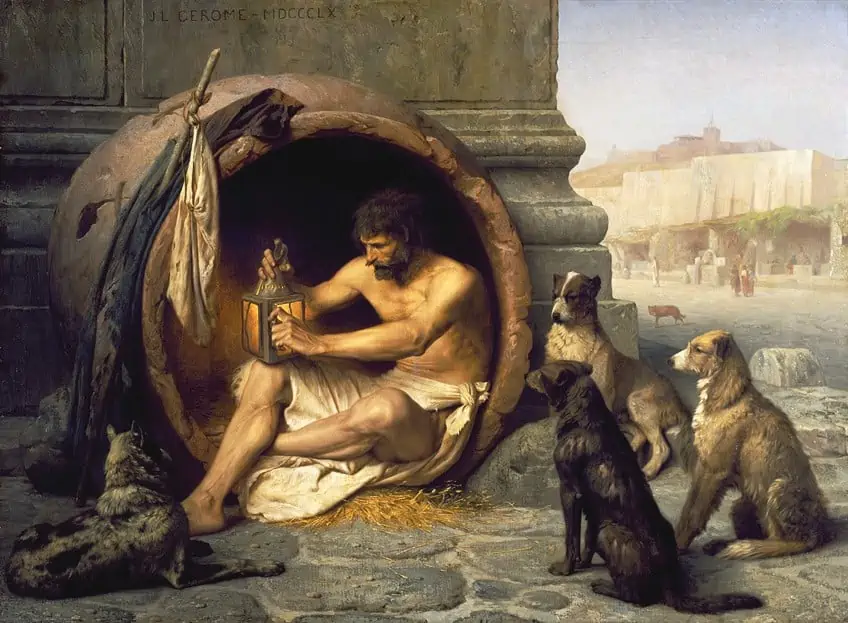
The dogs are thought to represent individuals who held Diogenes’ work and views in high regard. His companion dogs were also symbols of his “Cynic” worldview, which stressed austerity. Three years after this picture was initially shown, Gerome was hired as a work professor at the Ecole des Beaux-Arts, where he taught numerous pupils, both French and international.
King Charles Spaniel (1866) by Édouard Manet
| Artist | Édouard Manet (1832 – 1883) |
| Date Completed | 1866 |
| Medium | Oil on canvas |
| Current Location | National Gallery of Art, Washington D.C., United States |
Édouard Manet was one of the first painters of his time to dedicate most of his energy and attention to depicting scenes and characters from his own life rather than religious characters. This dog artwork was completed in 1866 and is an exquisite portrait of a little dog called a King Charles Spaniel.
The artwork bears many of the same characteristics as Manet’s other Impressionist classics.
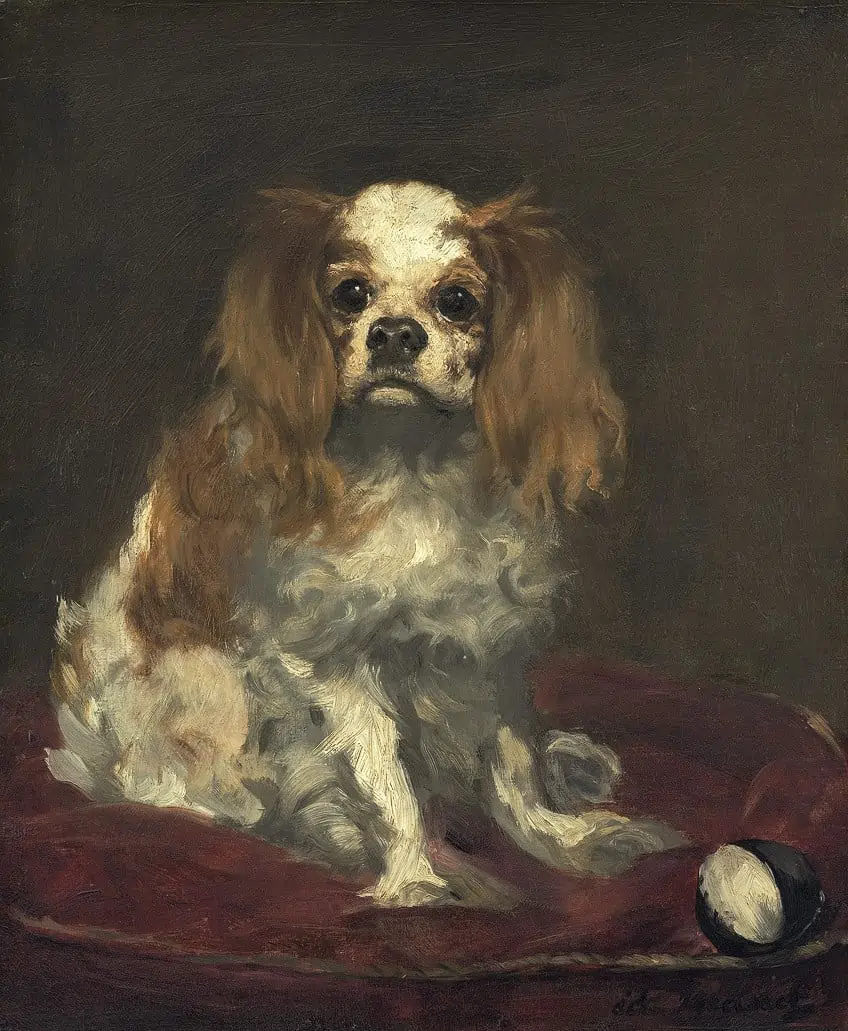
The dog is perched on a luxurious crimson pillow as if it were a regal individual. The artist’s brushstrokes beautifully depict the dog’s sweeping curls, and the coat seems to have a luster to it, indicating that it is well cared for.
Little Girl in a Blue Armchair (1878) by Mary Cassatt
| Artist | Mary Cassatt (1844 – 1926) |
| Date Completed | 1878 |
| Medium | Oil paint |
| Current Location | Musée d’Orsay, Paris, France |
Anybody who can recall being a child restricted and annoyed by the irrational restrictions of grownups will sympathize with this young girl who has launched herself into the adjacent blue sofa in a moment of frustration. Her tiny dog, too, has taken his position in a nearby armchair, although the pet’s attitude is one of calm and devotion rather than a yearning to be running and bouncing around like a child.
Mary Cassatt had a keen eye for capturing fleeting moments like the one seen in this dog artwork.
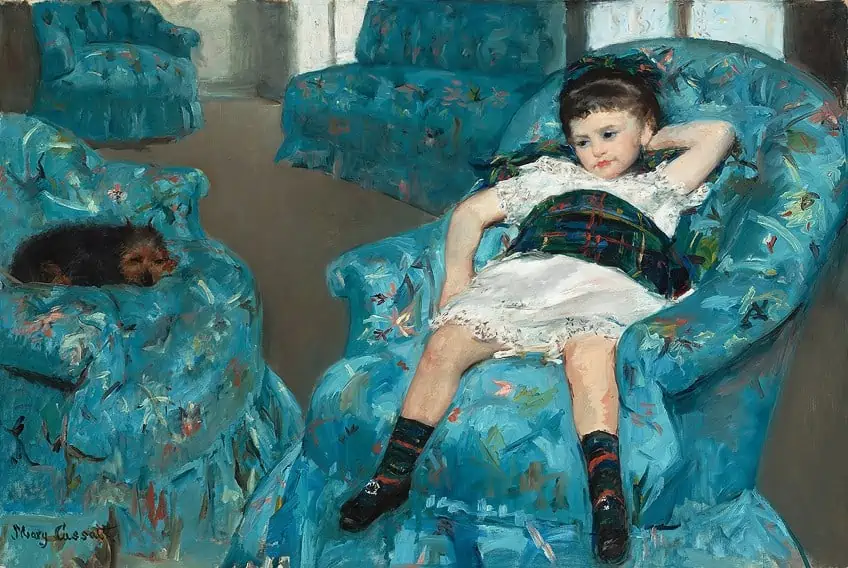
This picture is famous for both its compassionate presentation of the subject and the technical talents with which it was created. Cassatt’s good friend and the person who introduced Cassatt to the exciting and new field of the Impressionist Movement, Edgar Degas, assisted her with the canvas, offering both the theme and technical assistance with the artwork itself.
He is thought to have focused on the unusual form produced by the carpet gap between the armchairs, and his touch may be observed in the asymmetrical composition and chair patterns.
Arearea (1892) by Paul Gauguin
| Artist | Paul Gauguin (1848 – 1903) |
| Date Completed | 1892 |
| Medium | Oil on canvas |
| Current Location | Musée d’Orsay, Paris, France |
What makes this piece unique is that, rather than using abstract images, Gauguin used daily Tahitian surroundings and what can only be described as pretty conventional elements. This is visible not just in the use of naturalistic tones, but also in the presence of villagers, who frequently serve as centerpieces in many of his paintings during this era.
Arearea was also inspired by the various old practices he encountered on his tour.
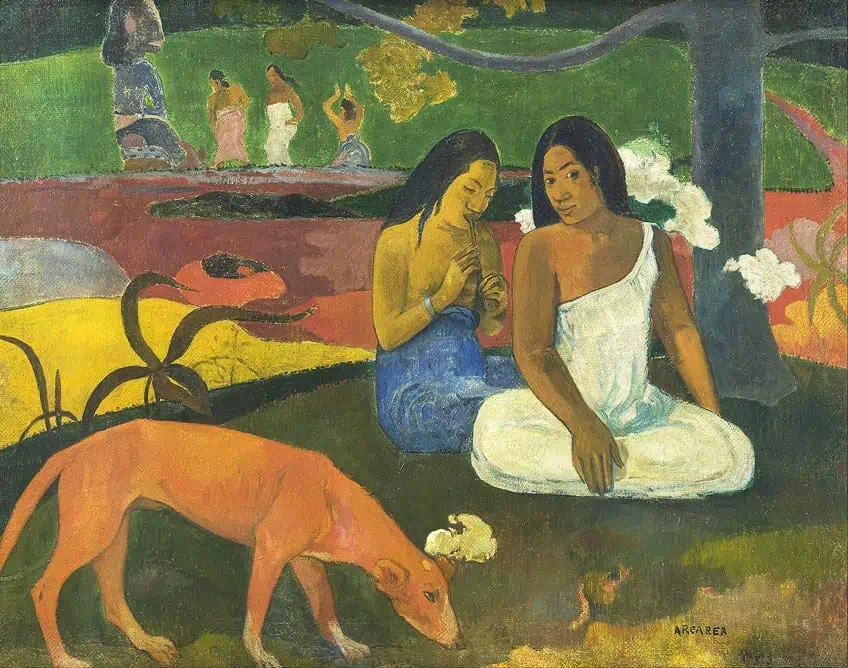
As a result, this picture has a mysterious air to it. Arearea, on the other hand, stands apart because both the metaphysical and the physical seem to live in harmony. Two sitting people and a huge red dog may be seen in the foreground. The background, on the other hand, takes on a more celestial quality.
Several people are seen worshiping what looks to be an old statue. A sequence of colored squares has supplicated the sky.
Julie Manet and Her Greyhound Laertes (1893) by Berthe Morisot
| Artist | Berthe Morisot (1841 – 1895) |
| Date Completed | 1893 |
| Medium | Oil on canvas |
| Current Location | Musée Marmottan Monet, Paris, France |
Berthe Morisot is another well-known Impressionist painter. Many of her paintings represent diverse social scenes or portraits of individuals, but this one features a woman and her pet dog. She was one of the most well-known female artists of the time, her style was genuinely distinctive and she flourished in the Impressionist movement owing to her aggressive use of brushstrokes and colors.
Morisot’s paintings were often classified as having “feminine appeal” by male reviewers due to their beauty and lightness.
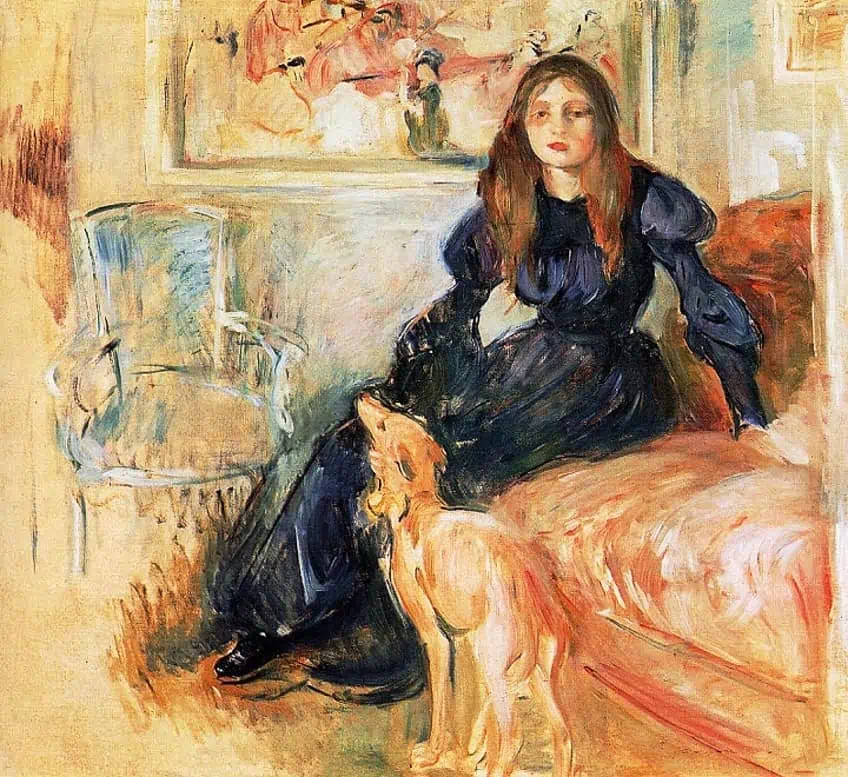
Because of her delicate brushstrokes, reviewers frequently used the verb effleurer (“to softly touch”) to characterize Berthe Morisot’s style. Morisot, like other Impressionists, worked in the open air in her early years to seek authenticity in observation.
Good Friends (1927) by Norman Rockwell
| Artist | Norman Rockwell (1894 – 1978) |
| Date Completed | 1927 |
| Medium | Oil painting |
| Current Location | Multiple Prints |
Rockwell’s artwork is well-known in America because of how he depicted aspects of common American life that are familiar and elicit a sense of nostalgia in many who remember an era gone by. The artwork expresses the pleasure of owning a dog, both through the way the dog seems to watch over the puppies with pride and in the way the pups cluster around the bowl the boy holds. Dogs are wonderful creatures with expressive personalities, and Rockwell masterfully portrayed the joys of spending time with them, particularly as a youngster.
The boy is dressed in what seems to be a scout uniform – another institution that forms part of the American way of life and nostalgia.
That covers our list of famous paintings with dogs. This list of famous dog paintings makes one realize just how close of a connection our species share. Dog painting artists were not necessarily a distinct group, but rather artists from many styles that all shared a common love for these incredible animals. If history is anything to go by, we will still be painting dogs in art for many years to come.
Take a look at our dog paintings webstory here!
Frequently Asked Questions
Why Do Artists Create Famous Dog Paintings?
Dogs are one of humankind’s closest allies. They have been with us for centuries, serving as work animals as well as companions. It is, therefore, no wonder that we have wanted to portray dogs in artworks to commemorate their work and love. Dogs symbolize loyalty, friendship, and security.
Which Artists Create Paintings with Dogs?
Almost any artist with a pet dog has at one time or another tried to portray their pooch. This includes the world’s most renowned dog painting artists who have been commissioned to create dog paintings for various canine-loving patrons. Famous artists include George Stubbs, Francisco Goya, Norman Rockwell, Paul Gauguin, Édouard Monet, and many more. Dogs have been a popular subject for artists to portray for centuries and there are even Roman mosaics that perfectly portray dogs, such as the Cave Canem mosaics, which were originally produced in the Ancient Roman era, making it one of the oldest known artistic portrayals of a dog.
Jordan Anthony is a Cape Town-based film photographer, curator, and arts writer. She holds a Bachelor of Art in Fine Arts from the University of the Witwatersrand, Johannesburg, where she explored themes like healing, identity, dreams, and intuitive creation in her Contemporary art practice. Jordan has collaborated with various local art institutions, including the KZNSA Gallery in Durban, the Turbine Art Fair, and the Wits Art Museum. Her photography focuses on abstract color manipulations, portraiture, candid shots, and urban landscapes. She’s intrigued by philosophy, memory, and esotericism, drawing inspiration from Surrealism, Fluxus, and ancient civilizations, as well as childhood influences and found objects. Jordan is working for artfilemagazine since 2022 and writes blog posts about art history and photography.
Learn more about Jordan Anthony and about us.
Cite this Article
Jordan, Anthony, “Famous Dog Paintings – Take a Look at the Best Dogs in Art.” artfilemagazine – Your Online Art Source. November 4, 2022. URL: https://artfilemagazine.com/famous-dog-paintings/
Anthony, J. (2022, 4 November). Famous Dog Paintings – Take a Look at the Best Dogs in Art. artfilemagazine – Your Online Art Source. https://artfilemagazine.com/famous-dog-paintings/
Anthony, Jordan. “Famous Dog Paintings – Take a Look at the Best Dogs in Art.” artfilemagazine – Your Online Art Source, November 4, 2022. https://artfilemagazine.com/famous-dog-paintings/.


